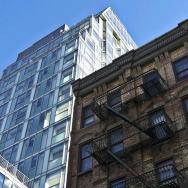How do civic and business leaders pass down their hard-won wisdom to the next generation?
The IMPACT Leadership Development program works to bridge that gap, connecting up-and-coming professionals with senior African American leaders throughout Chicago. Developed by the Chicago Urban League in partnership with the University of Chicago Booth School of Business, the program creates a stronger pipeline of talented individuals across the city’s public and private sectors.
“IMPACT has become a credential in its own right,” said Andrea Zopp, who helped found the program six years ago. “And that’s a huge plus, not only for the Urban League, but also for the participants in the program.”
Now president and CEO of World Business Chicago—an economic development nonprofit—Zopp started forming the idea for IMPACT back in 2012, when she led the Chicago Urban League. She had heard too often about “a disconnect” in mentorship between senior leaders and younger professionals within the city’s African American community. And for those who did reach greater heights of success, the view from the top could be incredibly lonely.
“What I knew from my own experience was that as you get more senior, in many instances, you’re alone or one of very, very few,” said Zopp, who has had a distinguished career spanning the corporate and civic spheres. “I wanted to give young African American leaders a network of like-experienced people from different backgrounds that they could call on for support, and I wanted to give them the skills to be better leaders.”
The result, Zopp thought, could be a strong cohort of up-and-coming African American professionals ready to take on C-suite roles in companies, or lead government or nonprofit entities. Zopp brought her idea to Derek Douglas, who had joined UChicago that same year as vice president for civic engagement and external affairs. The concept immediately resonated with him, and what he had experienced traveling the country in his previous role working on urban issues in the Obama White House.
“It was not on my radar screen when I first joined the White House, but this issue of pipeline kept coming up over and over,” said Douglas, who served on the Domestic Policy Council from 2009-11. “Many cities would say they understand there’s all these great visions and ideas for what they want to be, but they don’t have the people, or the people haven’t been developed, and there are no programs or ways out there to do it.”
Douglas brought Chicago Booth on board as an educational partner. George Wu, the John P. and Lillian A. Gould Professor of Behavioral Science at Chicago Booth, joined with the Urban League, helping develop a curriculum that combines a civic education with practical leadership skills—all within a classroom setting where participants feel safe sharing their personal experiences.
“They come together, they trust each other, and they inspire each other to do bigger and better things,” said Wu, who continues to be Booth’s faculty director for the program today. “You need that inspiration to be more ambitious, and you need the knowledge and resources and the network to deliver on that ambition. I think we’re able to provide the fellows with all of those things.”
Meeting monthly at Booth’s Gleacher Center downtown, the 35 fellows admitted to each cohort of the highly selective program learn and network together over nine months. Civic education modules cover African American history and politics in Chicago and their effect on current issues, such as health care, criminal justice and education. Guest speakers across industries visit to share their perspectives. Booth faculty teach leadership coursework on negotiations, decision-making, business ethics, power and influence, and interpersonal dynamics.
Felicia Rauls, a 2014 graduate of the Evening MBA Program, joined IMPACT in 2019. She initially thought that taking classes again at Booth with her MBA professors would be familiar territory.
“But that first day of IMPACT orientation, I was sitting in a Gleacher classroom like I had done countless times before, and I looked around, and all I saw were Black faces and it felt surreal,” Rauls said. “I had an instant feeling of ease, an unspoken connection and level of comfortability and confidence. I knew this time at Gleacher was going to be a much different experience.”
Rauls, senior vice president and director of operations at Chicago-based Mesirow Financial, said that kind of camaraderie is important to her—especially as a Black woman in finance, where just 12% of professionals are African American. She noted that the relationships she made with other fellows have extended even after IMPACT concluded.
“I’m really seeing the benefit of those connections during this time of social unrest triggered by the death of George Floyd, and just being able to have a network of individuals who lend their support and who are navigating the work place like I am (and have) is empowering,” Rauls said. “We don’t all have the same perspective or agree on every topic or approach, but we’re all navigating the workplace in similar situations.
“The diversity of thought offered by the fellows informs my perspective on how to address a variety of workplace issues. Just being able to have someone to chat with about diversity and inclusion topics, and ask, ‘If this situation came up, how would you deal with it?’ has been a great value-add from the program.”
Each IMPACT fellow is paired with a mentor from among Chicago’s senior African American leaders, to facilitate an intergenerational transfer of knowledge and help the fellows expand their network. It was this aspect of the program that attracted Constance Jones, a Harvard Business School graduate who joined the first IMPACT cohort in 2014, when she was still a Chicago newcomer.
“I really just wanted to engulf myself in the history of the city and the networks within the city that I was having a really hard time penetrating,” Jones said. During her time in IMPACT, Jones quickly applied what she learned and took a new job as chief external affairs officer of the Noble Network of Charter Schools—one of the largest charter school networks in Illinois, with 18 locations.
She became CEO in 2018, and was named one of the city’s 50 most powerful women this past spring by Chicago magazine. Jones credits IMPACT as a transformational part of that journey: “I went from knowing no one in the city to being one of those people who people want to know, which was so weird to me. IMPACT was very important in helping me get that network and understand the communities and deepen my relationships with communities here in Chicago.”
Those deep relationships help her serve Noble’s 12,000 students, most of whom are Black or Hispanic and live in underresourced neighborhoods on Chicago’s South and West Sides. “It is the most important work and the hardest work I’ve done, but we get amazing results,” Jones said. “I get so much joy out of seeing kids being able to accomplish their wildest dreams—and go from not believing they can, to believing in themselves.”
Zopp still attends each IMPACT graduation: “I get weepy. It’s very moving for me.” She marvels at each new group of young leaders, excited to get out into the city and make change in their communities.
What’s clear is that the seed of an idea planted six years ago is already flourishing. The program is training the next generation of leaders, ones who can help shape the Urban League’s stated vision: “A strong African American community is a better Chicago.”
“Oftentimes, we find that for African Americans, you can be very accomplished and get to a certain point, and then there’s that—it’s not a glass ceiling; it’s like a cement ceiling,” Zopp said. “IMPACT is about helping people break through that. We get them the skills, mentorship, and support they need to break through it and help them really think through where they want to be and how they want to have an impact in their community. And they are. And they do.”
—To read the full version of this story, visit the Booth School of Business website.

